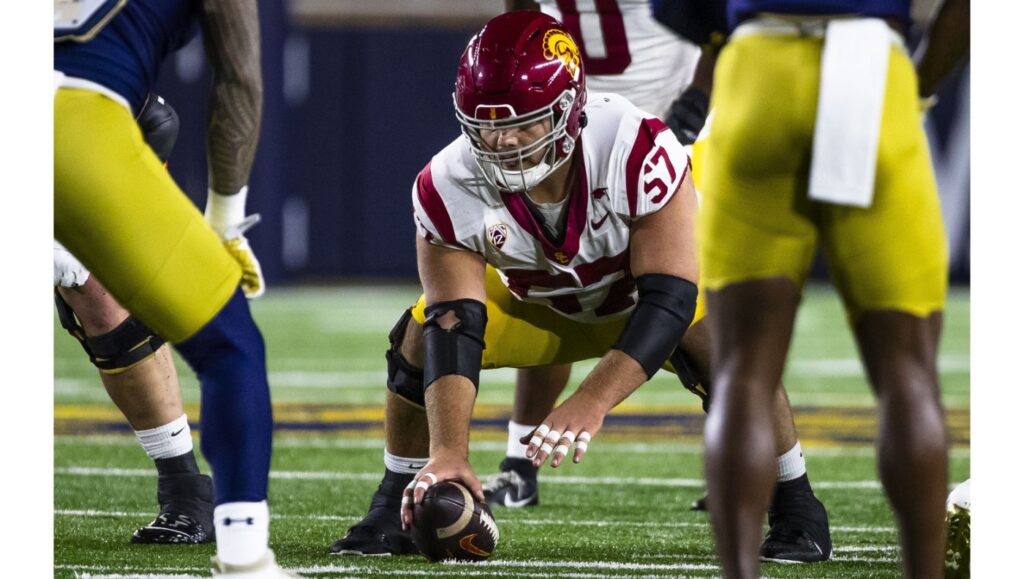
LOS ANGELES — Sometimes, the best explanation is the most simple one, and Josh Henson eventually started listing so many calamities he started to make himself laugh.
What, a question was posed to offensive line coach Henson on Wednesday night, were the most glaring issues jumping out from his unit in Saturday’s game against Notre Dame? Well, they were losing too many one-on-one battles in the running game, Henson responded. There were communication errors. There were technique errors.
“So, uh, not a very good performance the other night,” Henson chuckled, a veteran of the Big 12 and SEC who rarely sugarcoats. “I don’t, I can break it down, talk about it, whatever. We weren’t good enough.”
Last week, after some inconsistency in pass protection against Arizona and acknowledgment that the pocket folded on quarterback Caleb Williams a couple of times, Henson said areas of improvement were “always the same old things – it’s not this crisis thing.”
Well, the alarm’s sounding now.
USC allowed 13 pressures against Notre Dame, Williams trying to survive in a pocket crumpling against a five-man rush like Han Solo trying to stop the trash compactor in “Star Wars,” his normally-deft improvisation falling flat in front of a jeering Notre Dame audience. It was the most uncomfortable Williams has looked all season against pressure; he forced throws, certainly, that led to a career-worst game and three interceptions, but the line did him no favors.
“We’re putting him in bad scenarios too often,” left tackle Jonah Monheim said Wednesday, “and we’ve got to execute better and be better for him there, because we know that if we can give him time and we do our jobs, he’s the best player in the country.”
Issues with the pocket, Henson said, were mostly due to technique. The ability to set your hips and replace your hands. But technique needs to improve quickly, and drastically, or else a sinking ship will only plunge further; No. 18 USC (6-1 overall, 4-0 Pac-12) welcomes No. 14 Utah (5-1, 2-1 Pac-12) to the Coliseum on Saturday knowing the Utes boast a fearsome front that ranks tied for sixth in the FBS in sacks.
“The little things that you don’t see when you’re not playing as good competition, they start becoming big things, when you play good people,” Henson said Wednesday.
After a handful of admirably clean games to start the year, little things started to sprout around USC’s sloppy win against Arizona State, when the line allowed 11 pressures and 10 hurries, according to Pro Football Focus. That was masked, as usual, by Williams’ brilliance in a five-touchdown game.
There was no masking the struggles on Saturday. And with transfer guards Emmanuel Pregnon and Jarrett Kingston pushed back all too often, center Justin Dedich’s ongoing issues with penalties and right tackle Michael Tarquin benched two weeks in a row, USC’s staff has “talked position moves with every spot,” Henson said, outside of solid-as-a-rock Monheim.
Redshirt sophomore Mason Murphy has played considerably more snaps than Tarquin at right tackle the past couple of games, and he appears the most likely candidate to shift into the starting lineup, Henson saying that a decision would be made after Thursday’s practice but that Murphy had “obviously played more the last two games.”
At some point, however, the talent cupboard runs dry, Henson pointing to walk-on Killian O’Connor as the next-best backup performer in practice.
USC has built its current line largely through the transfer portal, recruiting exactly two linemen rated as four-stars or better across the last four recruiting classes: freshmen Elijah Paige and Micah Banuelos, both of whom have played sparingly this year. Pac-12 foes Oregon and Washington have signed eight and six, respectively, in the same timeframe.
And if technique can’t improve across the last half of 2023 – the first major test coming with Utah – it might come time for USC to starkly re-evaluate its approach to building a program up front.
“We’ve had our moments this year,” Henson said. “We’re hoping to have more.”
